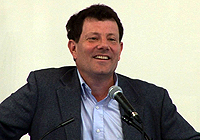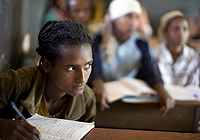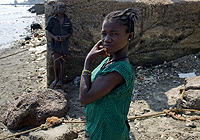Nicholas Kristof cites gender inequity as the central moral challenge of the century
Best-selling author and Pulitzer Prize winning New York Times columnist Nicholas Kristof has told a UNICEF conference that gender inequity is the central moral challenge of the 21st century.

VIDEO: Watch now
Best-selling author and Pulitzer Prize winning New York Times columnist Nicholas Kristof addresses a UNICEF-sponsored conference in New York.
|
Mr. Kristof, who together with his wife Sheryl Wudunn wrote the book 'Half the Sky: Turning Oppression into Opportunity for Women Worldwide,' said equal rights for women and girls are as big an issue today as slavery was in the 18th and 19th centuries.
Deadly discrimination
Mr. Kristof spoke yesterday at the conference 'Adolescent Girls – Cornerstone of Society: Building Evidence and Policies for Inclusive Societies,' which was organized jointly by UNICEF and the New School Graduate Program in International Affairs. Addressing conference delegates, he said that when there are not enough resources to go around, girls are often starved of food and denied health care in favour of their brothers.
That discrimination is lethal, Mr. Kristof added, totalling a stunning 2 million deaths every year.
"In the last 50 years, more women and girls have been discriminated against to death than all the men who died in all the battles of the 20th century," he said.

© UNICEF/NYHQ2009-2291/Holt
A girl takes notes in class at Imdibir Secondary School in Imdibir, Ethiopia. UNICEF supports in-class dialogue about harmful social practices, including female genital mutilation/cutting. Both girls and boys participate in the discussions.
|
A modern-day epidemic
Mr. Kristof cited human trafficking, lack of education and weak maternal and reproductive health care as three challenges that must be tackled before women and girls can take their equal place in society.
Outlining the huge dimensions of modern-day trafficking, he noted that during the historical period of the transatlantic slave trade, some 80,000 human beings were trafficked every year. Today, the US Department of State estimates that about 800,000 people – mostly women and girls – are trafficked across international borders annually. Additional thousands are trafficked within national borders.
In contrast to historical slaves, each of whom represented an investment of about $40,000 in today's currency, this century's slaves are thought to be worth only a few hundred dollars. Their enslavers are prepared to maim and kill them if they become uncooperative.

© UNICEF/NYHQ2009-2335/Kamber
N'balou, 10, stands in the port where she lives and works in Conakry, Guinea. She was trafficked from Freetown, Sierra Leone, when she was very young.
|
"These slaves are so valueless, they're disposable," said Mr. Kristof.
Empowerment through education
While there is "no silver bullet in development" with regard to improving the situation of women and girls, said Mr. Krostof, education is one of the most effective ways to bring women and girls – and by extension their countries – out of poverty.
"One of the levers we can use to affect a broad range of other areas in development – from reproductive health, to other kinds of health, to financial empowerment to security – is indeed education," he concluded.